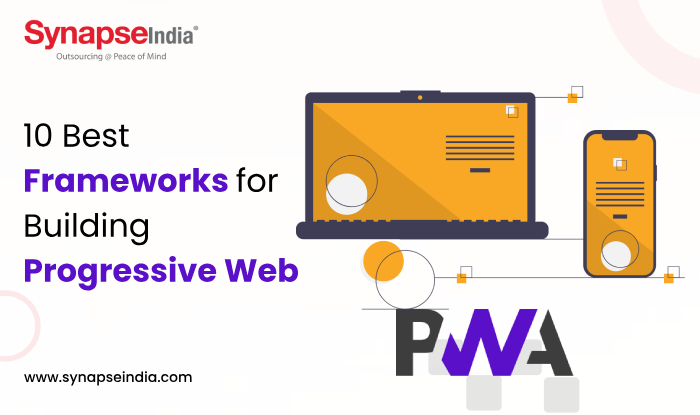 17 Feb 2024
17 Feb 2024“Progressive Web Apps (PWAs) are a type of web application that utilizes modern web technologies to deliver a user experience similar to that of native mobile apps. Here we are discussing about top 10 frameworks for building PWAs.”

One of the main web technologies that offer diverse capabilities for developing scalable and robust applications is Progressive Web Apps (PWA). It includes seamless cross-platform and cross-device performance, offline functionality, and push notifications. The most popular PWA applications are Soptify, Pinterest, Starbucks, and Twitter. These advancements in technologies have increased the popularity of PWAs and hence provide the right platform to build scalable applications using the right framework. In this blog, let’s delve into the major frameworks for PWA for building progressive web apps per your project's requirements.
Progressive web applications (PWA) are a mixture of mobile and web apps. It acts as a webpage that functions as a mobile app without installation of the app from the store. This allows the application to be located anywhere by a search engine using a browser. PWA frameworks don’t need to deploy like Native Apps, but their primary objective is to reuse the existing code to provide a mobile experience. Implementing PWA creates an innovative approach that targets mobile platforms for Android, iOS, and MacOS which proves to be a game changer for enterprise mobility.
The Progressive Web Apps are reliable and simple, and developers can employ different frameworks to develop PWAs, here are the top 10 frameworks for PWA:

Angular is a promising PWA framework that is used to develop PWA framework applications. It was released by Google in 2009, and widespread as a top-notch PWA app development. Angular works on the JavaScript ecosystem which creates a reliable, robust, and responsive application. Here are a few benefits of the Angular framework:
Being one of the top framework libraries, it is known to simplify coding that reaches high-speed rendering. Vue.js also allows projects to scale and add an advantage of extra packages:
React was released by Facebook in 2013, which incorporates with JavaScript library thus makes a standard option among the community of developers. Its PWA framework platform creates single-page and multi-page apps that consist of loads and alters within a single page. Reactjs delivers an extensive PWA solution that employs the JSX render function to connect with HTML futons:

Ionic is an open-source SDK created in 2013 which is used to create over 5 million hybrid applications. It uses to employ Apache Cordova and Angular Progresive Web App framework to develop applications. Ionic includes comprehensive components of the library for iOS and Android which makes it a perfect choice for developing PWA frameworks. This can even be used as a Web-view enabled web page that can be run within the device of the browser.
The polymer has a wide variety of tools, templates, and components. Also, it has been an excellent choice for PWA development, as it simplifies the operations.
Magento PWA studio is recognized as a set of tools that enables to development of PWA by using the Magento eCommerce Platform. This studio provides everything where the user can easily create, deploy, and manage PWA, including tools that are used for building interfaces. It also manages data and easily test the application.
ScandiPWA is an open-source framework for PWA frameworks that is built on Magento PWA studio. It lets you develop PWAs using the Magento eCommerce platform. It also offers multiple features that are needed to build, deploy, and manage a PWA. It includes the tools for creating user interfaces, managing data, and testing your application.
Svelte is a JavaScript framework that develops PWAs. It offers lightweight and seamless usability and makes code load faster. Additionally, apps that are built in Svelte are known for their optimized performance with a high grade of interactivity.
Introduced by Google, Lighthouse is used to enhance the quality of web apps. As a PWA development tool, it measures your website while considering every aspect and enlisting the factors required to build your progressive web apps.
As a JavaScript framework, it is similar to React but smaller and faster than React. As an easy-to-use framework, Preact is an excellent choice for developers who are new to the web development landscape.
The future of Progressive Web Apps (PWAs) appears promising, poised to redefine the digital landscape by offering enhanced user experiences across devices. PWA frameworks combine the best of web and mobile app technologies, delivering fast, reliable, and engaging experiences while eliminating the need for traditional app stores. With advancements in web technologies like Service Workers and Web App Manifests, PWAs continue to evolve, offering offline capabilities, push notifications, and seamless installations. As businesses increasingly prioritize mobile-first strategies and user-centric experiences, PWAs are expected to play a pivotal role in driving engagement, conversions, and customer satisfaction in the digital ecosystem.


